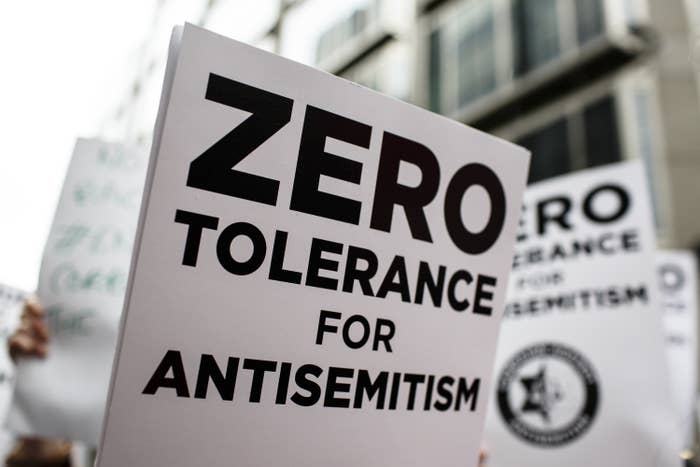
This is an excerpt from Quibbles & Bits, the BuzzFeed News copy desk’s newsletter. Sign up below to nerd out about language and style with us once a month!
On the BuzzFeed News copy desk, we are constantly unpacking the minutiae of language — precisely because the smallest detail can have a big impact. Even something as tiny as a hyphen.
Moving forward, our style guide will include “antisemitism” — one word, no hyphen — as opposed to “anti-Semitism.” Our new guidance contradicts the dictionary we reference and AP style, but the history behind the term has made it clear that this is a necessary change. The International Holocaust Remembrance Alliance and the Anti-Defamation League have supported the usage of “antisemitism” to cut the word’s original ties to what the IHRA calls a “pseudo-scientific racial classification.”
A recent viral Twitter thread posted by @challahbackjew, whose name is Lindsay, explained the problem with the styling of “anti-Semitism.” Lindsay told BuzzFeed News that she tweeted about the topic after seeing a statement from the Grammys that used a hyphen in the word. The response to her thread was “overwhelmingly positive,” she said. “A lot of people mentioned that they didn’t know about the history of the word, including a lot of other Jewish people!”
Okay here’s a quick explanation about why it’s “antisemitism” and not “anti-semitism” aka why you shouldn’t use the dash:
The term “anti-Semitism” breaks down as soon as you look closely at its parts. As Lindsay’s thread highlights, “Semitic” refers to a group of languages that originated in the Middle East. The people who speak those languages “do not otherwise have shared heritage or history,” the ADL points out, adding, “There is no such thing as a Semitic peoplehood.” And antisemitism is defined as discrimination against or hostility toward Jewish people — not against those who speak a Semitic language. The meaning of “Semitic” was twisted by German journalist Wilhelm Marr, considered the “father of modern antisemitism,” who in the late 1800s introduced the term “Antisemitismus” to refer to hatred of Jewish people under the guise of a made-up race, which itself is othering.
The IHRA says the hyphenated spelling “legitimizes a form of pseudo-scientific racial classification that was thoroughly discredited by association with Nazi ideology” and “divides the term, stripping it from its meaning of opposition and hatred toward Jews.” It also notes that many languages, including German, French, and Spanish, do not hyphenate the term. “Leaving out the hyphen is one way of rejecting ‘Semite’ as a meaningful term,” the IHRA told BuzzFeed News.
“On the face of it, this may seem like a purely pedantic issue,” the IHRA told us. “We live in a time, however, when language is increasingly weaponized and used to chip away at democratic values, and when Jews are increasingly scapegoated and targeted for violent actions.”
The hyphen accentuates “Semitism” and implies the existence of a Semitic race of people. The word “antisemitism” itself isn’t ideal because of its history — writers may opt for terms like “anti-Jewish discrimination” in its place — but as long as the term is widely used, this is how we’ll style it. “While removing a hyphen by itself won’t defeat antisemitism,” the ADL says, “we believe this slight alteration will help to clarify understanding of this age-old hatred.”
What’s New in the BuzzFeed Style Guide
maskless (no hyphen)
throughline (one word)
LaKeith Stanfield (capital K)
Use “detention” and “incarceration” rather than “internment” when referring to the forced relocation of Japanese Americans to camps during World War II.
prepandemic, postpandemic (no hyphens)
As you may have noticed at the top of the newsletter, we are no longer identifying ourselves as the one-word copydesk, despite what Merriam-Webster says, but the copy desk.
4 Things We’ve Been Reading
Asian American Journalists Association: Guidance on Atlanta Shootings and Anti-Asian Hate Incidents
BuzzFeed News: What’s in Your “Other” Name? Asian Americans Are Trying to Reclaim Their Native First Names and Wear Them Proudly.
Mother Jones: The Worst People Keep Stealing the Language of Black Struggle
The New York Times: American Sign Language Finds Its Spotlight
And finally, a tweet:
the logical next step in the evolution of english pronouns is th'all

